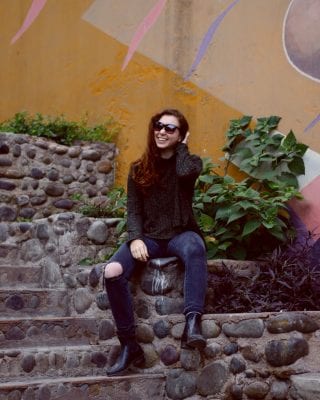A Q&A with Anthropology, Biology and Latin American Studies Major Katjana Wiederkehr
 Katjana Wiederkehr
Katjana Wiederkehr
Undergraduate Majoring in Anthropology, Biology and Latin American Studies
In this conversation, Wiederkehr talks about the importance of studying abroad, her love of people and Latin American cultures, finding advice and friendship at Fulbright College, and her desire to create a career that allows her to improve the health care situation and lives of the people around her.
Q: Tell us a little about your academic passions, research and/or what you’re studying within the college. What excites you about this?
As a self-proclaimed people watcher I have always loved studying culture and how humans interact with the world around them.
I found that anthropology fit that passion perfectly, and as I dove deeper into my classes I realized that I loved learning about Latin American culture specifically.
I find the syncretic nature of Latin American cultures absolutely fascinating and think Latin American studies is particularly relevant today in the U.S. as well.
As for my biology major, I would like to eventually work on crafting more holistic and culturally sensitive health care policies and practices in order to someday make our health care system more efficient for everyone.
Q: How long have you been at Fulbright College? What have you enjoyed most about your time here?
I have been with the Fulbright College since I started school at the U of A my freshman year.
As for what I have enjoyed most here, it would probably have to be the sense of community my peers and mentors have built during my time with the college.
I can always find advice and friendship at Fulbright. I am also always prompted to be my very best in Fulbright and this pushes me both academically and as a person.
Q: What has your favorite class been so far and why?
I have loved so many of my classes but I think my favorite would be Religion in Latin America. It was the class (and teacher, Dr. Erickson!) that helped me decide to add my Latin American Studies major.
Not only was the class extremely interesting, but it highlighted the diverse nature of religion and how it permeates into many other aspects of culture.
I recently took a Shamanism and Traditional Healing class in Peru though, and this might overtake Religion in Latin America as the favorite simply due to the hands-on experiences I was able to have in class.
Q: What advice would you give to new students about to join the college?
I feel like my advice will probably echo the advice of many others, but I think mainly you just need to find what works for you in terms of schedule, studying and being on your own.
Always have a plan, but always know that it can and will change. Also, do not leave school with regrets.
If you are passionate about something, at least give it a chance whether it is realistic or not. If you give it your all and it doesn’t work out, it is better than not taking that chance for something you love and regretting it the rest of your life.
Lastly, if you have an opportunity to study abroad, do it. It is so important to experience the world in a new way, and to see it through the eyes of a different person/culture.
Not only will it give you a new perspective on your studies, but it will give you a valuable new perspective on life. I think everyone needs to travel abroad at least some point in their lives, and college is a great place to do it.
Q: What do you like to do during your time outside of the university?
I probably watch too much Netflix to be completely honest.
But, I love to hang out with my friends and play video games.
I really enjoy hiking, going to the theater, working on my photography, and you can usually find me singing. You can ask anyone, I really never stop singing!
Q: When do you anticipate graduating, and what’s up next on the horizon for you?
I plan on graduating May of 2020 and then going to graduate school to obtain my M.P.H. and Ph.D. in epidemiology.
After all my schooling is over, I hope to work doing research for an international nonprofit or a health care organization like the World Health Organization or the Red Cross.
But who knows what could happen? I mainly hope to get a job where I can improve the health care situation and lives of the people around me.
Q: Is there anything else you’d like to add or let readers know?
I hope everyone has a great semester! Thanks so much for considering me for this!
Andra Parrish Liwag
Director of Communications, J. William Fulbright College of Arts and Sciences
479-575-4393 // liwag@uark.edu

